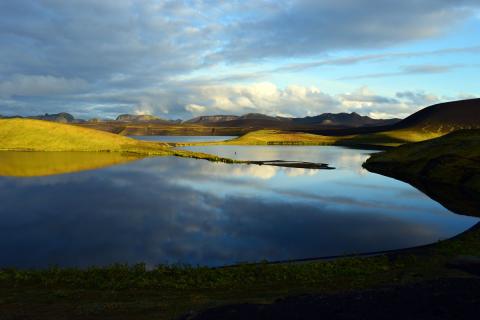Water
Fresh water is an abundant resource in Iceland. Both surface water and groundwater originate from precipitation that has fallen to Earth, as do glaciers. Surface water is found on the Earth’s surface, where it forms lakes, ponds, rivers, and streams.
Water erosion from surface water plays a major role in shaping the landscape, for example by carving riverbeds and canyons into bedrock and surficial deposits and triggering landslides.
The permeability of strata is variable and depends on the age of the Icelandic bedrock. Permeability is highest in Iceland’s active volcanic zones, which are characterised by young rock and deep fissures. Permeability decreases in older bedrock. Groundwater is water that has seeped into the ground, infiltrating fissures and cavities in the bedrock, where it can reach down to considerable depths. If groundwater comes into contact with hot intrusive rock then the water will heat up, causing it to rise to the surface and form a geothermal area.
Drinking water in Iceland originates mainly from groundwater (96%). Icelandic water has a low chemical content compared to that of other countries, a major factor being the mainly basaltic composition of the bedrock. Drinking water is alkaline, with a pH of 6.5–9.5. Low concentrations of calcium and magnesium ions mean that the water is classified as soft.
The international community has defined access to clean drinking water as a basic human right, essential for the well-being of all the Earth’s inhabitants. In 2007, Iceland adopted the EU Water Framework Directive from 2000 (see the Summary Report of the Environmental Agency of Iceland). The Water Framework Directive contains rules on water collection, water protection, and monitoring. Article 1 states: “Water is not a commercial product like any other but, rather, a heritage which must be protected, defended and treated as such.”
Icelandic legislation and regulations on water protection expressly ban water pollution. The Environment Agency of Iceland, together with municipal boards of health, handles monitoring of water protection areas. The Icelandic Meteorological Office is responsible for hydrological research in Iceland.
